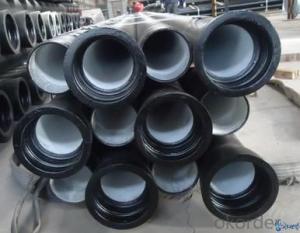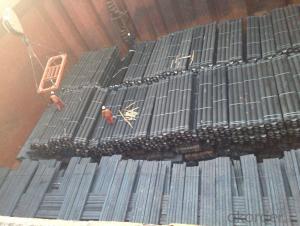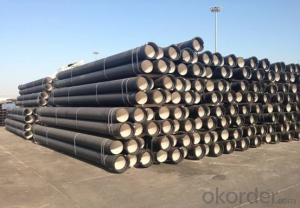DUCTILE IRON PIPES K8 DN150
- Loading Port:
- China Main Port
- Payment Terms:
- TT OR LC
- Min Order Qty:
- -
- Supply Capability:
- -
OKorder Service Pledge
OKorder Financial Service
You Might Also Like
Ductile Iron Cast Pipe is without any defects compare with tradition casting tech, which has many advantages particularly as follow:
(1) High density. In the "vertical upward casting" process, the melt iron of centre liquid column in center crystallizer is continuously feeding for volume shrinkage caused by condensation tube at outer circumference , which lead to be free of shrinkage porosity.
(2) High purity. When melt iron pouring, the mixed impurities such as gas, dross, sand grain which are lighter than melt iron could be eliminated at furnace mouth, its impossible to enter into the crystallizer through the channel, so the melt iron into the crystallizer is very pure.
(3) Strength with toughness. The cooling speed provided by continuous crystallizer is 30 times than sand casting and 5 times than centrifugal casting, and doesn't produce white iron, the eutectic cell volume of continuous cast iron is one eighth to one tenth compare with traditional cast iron. The density of graphite nodule in ductile iron can reach 300-700 pcs/mm2. Therefore, all reason above improve the strength and toughness of continuous cast iron.
(4) Free machining. The high speed cooling make the hardening phase (such as boride, steadite) not appear like reticular, massive or thick, but diffuse like fish bone and pane in shape, moreover, there are tiny graphite flakes inlaid hardening phase. It's free machining in BrinellHardness the range of 250-300HB. However, the Brinell Hardness of 250 is top limit to common metal materials.
(5) Uniform composition of tube wall. The convection mixing of liquid column caused by marching type drawing in crystallizer make the composition of tube wall well-distributed, and concentration gradient very little.
(6) High productivity. To the wall thickness of tube under 10mm, the speed of continuous casting is 1 meter/min, to the wall thickness of tube under 20mm, the speed of continuous casting is 0.5 meter/min, which is high efficiency that centrifugal or other casting tech couldn't reach.
- Q:Are ductile iron pipes resistant to microbiologically induced corrosion?
- Yes, ductile iron pipes are generally resistant to microbiologically induced corrosion (MIC). Ductile iron is a type of cast iron that has been treated with magnesium to give it increased strength and flexibility. This treatment creates a protective layer on the surface of the iron, making it less susceptible to corrosion caused by microorganisms. MIC occurs when certain types of bacteria, fungi, or other microorganisms interact with the metal surface of pipes and produce corrosive byproducts. However, ductile iron is generally resistant to MIC because the protective layer formed during the manufacturing process acts as a barrier, preventing microorganisms from directly contacting the metal surface. Additionally, ductile iron pipes are often lined with cement mortar or other protective coatings, which further enhance their resistance to corrosion. These linings provide an additional layer of protection against microorganisms, reducing the potential for MIC. Despite these inherent resistance properties, it is important to note that the resistance to MIC can vary depending on the specific conditions and environment in which the pipes are installed. Factors such as water quality, temperature, and the presence of certain microorganisms can influence the susceptibility of ductile iron pipes to MIC. Therefore, it is essential to consider these factors and take appropriate measures to prevent MIC, such as regular monitoring of water quality, proper maintenance, and the use of corrosion inhibitors or biocides when necessary.
- Q:Can ductile iron pipe be used for mining applications?
- Yes, ductile iron pipe can be used for mining applications. It is commonly used in mining operations due to its high strength, durability, and resistance to corrosion. Ductile iron pipe can withstand the harsh conditions and demanding requirements of mining, making it a suitable choice for transporting water, slurry, and other substances in mining operations.
- Q:Are ductile iron pipes resistant to environmental stress cracking?
- Yes, ductile iron pipes are resistant to environmental stress cracking. Ductile iron is a type of cast iron that has been treated with trace amounts of magnesium to improve its strength and ductility. This treatment makes ductile iron pipes highly resistant to cracking and damage caused by environmental stressors such as temperature fluctuations, soil movement, and corrosive elements in the surrounding environment. Additionally, the inherent strength and flexibility of ductile iron allow it to withstand high levels of external pressure and stress without cracking or failing. Overall, ductile iron pipes are a durable and reliable choice for various applications, including water and wastewater transportation, due to their resistance to environmental stress cracking.
- Q:Are ductile iron pipes suitable for use in oil refineries?
- Ductile iron pipes are an excellent choice for oil refineries as they offer a unique combination of strength, durability, and flexibility. These pipes possess high tensile strength, enabling them to withstand the intense pressure and stress commonly encountered in oil refining. Their ability to transport fluids such as crude oil, refined petroleum products, and chemicals within the refinery is crucial. Furthermore, ductile iron pipes exhibit exceptional corrosion resistance, protecting them from the corrosive effects of oil, chemicals, and other substances present in oil refineries. This quality ensures the pipes' longevity and reliability, reducing the need for frequent maintenance and replacement. Moreover, ductile iron pipes possess remarkable ductility, enabling them to absorb significant impacts and vibrations without fracturing or breaking. This characteristic proves advantageous in oil refineries, considering the potential movement or stressors caused by machinery, equipment, or ground settlement. Additionally, the pipes' smooth interior surface minimizes friction, facilitating efficient fluid flow and reducing pressure loss. This feature plays a vital role in optimizing fluid transportation within oil refineries, ensuring a smooth and reliable production process. In summary, ductile iron pipes are well-suited for oil refineries due to their high tensile strength, corrosion resistance, ductility, and smooth interior surface. These pipes provide a trustworthy and long-lasting solution for fluid transportation within the refinery, contributing to the efficient and safe operation of oil refining processes.
- Q:Can ductile iron pipe be used for municipal water supply?
- Yes, ductile iron pipe can be used for municipal water supply. Ductile iron pipe has excellent strength and durability, making it suitable for carrying the high-pressure water supply required for municipal systems. Additionally, its corrosion resistance and long lifespan make it a reliable choice for transporting water in urban areas.
- Q:Are ductile iron pipes resistant to external loads?
- Generally, external loads pose little challenge to ductile iron pipes. Ductile iron, a variant of cast iron, undergoes treatment with magnesium and cerium additives to enhance its flexibility and durability. As a result, these pipes possess the ability to endure substantial external pressure and stress without succumbing to cracks or fractures. Ductile iron pipes find extensive implementation in scenarios where heavy loads are anticipated, including underground water distribution systems, sewer lines, and industrial pipelines. Their exceptional resistance to external loads has been thoroughly validated, establishing them as a dependable option for diverse infrastructure ventures.
- Q:Are ductile iron pipes suitable for underground storage tanks?
- Underground storage tanks can indeed benefit from the use of ductile iron pipes. Ductile iron, known for its strength and durability, exhibits exceptional resistance to corrosion and can withstand the immense pressure and weight associated with burial underground. These pipes find widespread application in various underground systems, such as water and sewage systems, owing to their remarkable tensile strength and ability to handle both internal and external loads. Furthermore, ductile iron pipes boast an extended service life, often surpassing 100 years, rendering them a dependable choice for underground storage tanks. They also possess resistance against ground movement and can adapt to soil settling or shifting, thereby ensuring the integrity and stability of the storage tank system. Moreover, the smooth internal surface of ductile iron pipes provides excellent flow characteristics, preventing the accumulation of debris or sediment that may impede the system. Hence, they prove to be an ideal option for storing a diverse range of liquids or substances. In conclusion, the strength, durability, corrosion resistance, and long service life of ductile iron pipes establish them as a suitable and reliable choice for underground storage tanks.
- Q:The design uses water supply ductile iron pipe, PE corrosion protection pipe, HDPE pipe, please ask that good? What's the price of the two?
- Now the mainstream is PE pipe, ductile iron pipe has been going out.
- Q:What is the excavation width of ductile iron pipes with diameters greater than 1400?
- When the condition does not allow enough slope, it is necessary to do wall protection and other means to ensure safetyRemind me, such a big pipe, dig deep in two ways. One is the depth diameter (range at the junction of 1.6 m in length and 500 for manholes and operation. The lower bolt assembly when) there is a depth diameter plus 500. and then in the trench laying branch the pier, installed after the fine stone tamped backfill.Can also be buried directly with the pipe diameter, and then put into the assembly. This method requires a large space on the ground, otherwise, the volume is too large after assembly, weight is too heavy, may cause damage to the pipeline and personnel injuries
- Q:Can ductile iron pipes be used for submarine pipelines?
- Yes, ductile iron pipes can be used for submarine pipelines. Ductile iron is a strong and durable material that can withstand the harsh conditions underwater, making it suitable for submarine applications. Additionally, its corrosion resistance properties make it a reliable choice for transporting fluids in marine environments.
1. Manufacturer Overview |
|
|---|---|
| Location | |
| Year Established | |
| Annual Output Value | |
| Main Markets | |
| Company Certifications | |
2. Manufacturer Certificates |
|
|---|---|
| a) Certification Name | |
| Range | |
| Reference | |
| Validity Period | |
3. Manufacturer Capability |
|
|---|---|
| a)Trade Capacity | |
| Nearest Port | |
| Export Percentage | |
| No.of Employees in Trade Department | |
| Language Spoken: | |
| b)Factory Information | |
| Factory Size: | |
| No. of Production Lines | |
| Contract Manufacturing | |
| Product Price Range | |
Send your message to us
DUCTILE IRON PIPES K8 DN150
- Loading Port:
- China Main Port
- Payment Terms:
- TT OR LC
- Min Order Qty:
- -
- Supply Capability:
- -
OKorder Service Pledge
OKorder Financial Service
Similar products
New products
Hot products
Related keywords




























